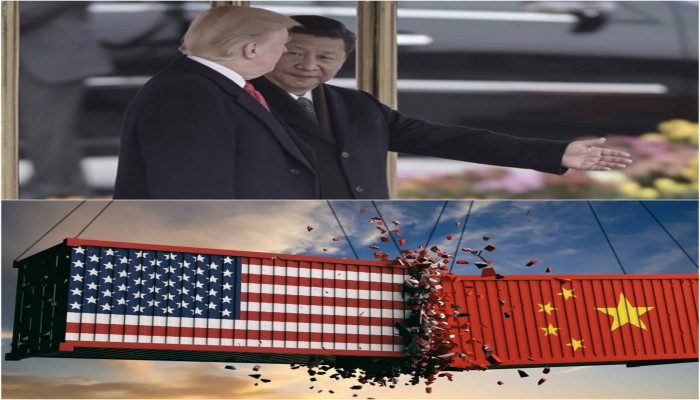Trump’s 104% tariffs spark stern response from China
- In Reports
- 12:54 PM, Apr 09, 2025
- Myind Staff
On Tuesday, tensions between China and the United States escalated into what appears to be a full-blown trade war, as U.S. President Donald Trump slapped a massive 104 per cent tariff on all Chinese imports. Both countries stood firm in this high-stakes standoff, with Beijing declaring it would resist American pressure until the end. Trump had initially announced an additional 34 per cent tariff on Chinese products. In response, China returned with a matching 34 per cent duty on U.S. goods. This led Washington to threaten another 50 per cent tariff. Combined with earlier tariffs introduced in February and March, the total increase in Chinese imports during Trump’s second term now adds up to 104 per cent.
Beijing strongly condemned what it described as US blackmail and declared it would "fight it to the end." In a Tuesday conversation with European Commission President Ursula Von der Leyen, Chinese Premier Li Qiang said China is prepared to "fully offset" any negative impact from external challenges. He also reaffirmed his confidence in "maintaining sustained and healthy economic development" for the country in 2025, despite the latest tariff threat from the US President.
China’s second-in-command under President Xi Jinping stated that the country’s macroeconomic policies for the year have been carefully designed to account for multiple uncertainties. He criticised the U.S. for imposing punitive measures on all its trading partners, calling it a clear example of unilateralism, protectionism, and economic coercion. He also emphasised that China’s strong response aims to protect its interests and uphold global trade norms.
According to a Bloomberg report, Li told Von der Leyen, "Protectionism leads nowhere - openness and cooperation are the right path for all.” His remarks came as Beijing responded firmly to Trump’s actions, even as major US stock indexes dropped again on Tuesday and Trump stayed defiant.
The China-EU conversation took place just hours before both economies were affected by Trump’s so-called reciprocal tariffs, with Europe set to face an additional 20 per cent duty.
The global economy has been shaken since Trump’s initial 10 per cent tariffs came into effect over the weekend, leading to a sharp sell-off in markets worldwide and increasing concerns about a possible recession. Starting Wednesday, import duties on goods coming into the U.S. from several countries are set to rise even more. Trump argues that his approach will help bring back America’s manufacturing sector by pressuring companies to move their operations to the U.S. However, many economists and business analysts are sceptical about how soon, or even if, this shift will happen, warning that the tariffs could lead to rising prices and increased inflation.
On Tuesday, Trump stated the United States was "taking in almost $2 billion a day" from tariffs.
After Trump stood firm on his tariff plans, Canada announced it would begin imposing its tariffs on certain U.S. auto imports starting Wednesday. The European Union, which Trump has heavily criticised over its trade policies, is also expected to respond next week to the new 20 per cent tariffs it now faces. French President Emmanuel Macron urged Trump to reconsider his stance but said that if the EU has to retaliate, "so be it." According to a document reviewed by AFP, in response to the U.S. tariffs on steel and aluminium that came into effect last month, the EU is preparing to impose tariffs of up to 25 per cent on a range of American products, including soybeans and motorcycles. Meanwhile, the Italian Prime Minister, Giorgia Meloni , seeking concessions, has scheduled a meeting with President Trump on April 17th, the White House secretary announced.
On Tuesday, Trump said his administration was working on "tailored deals" with various trade partners, and the White House noted that allies such as Japan and South Korea would be given priority. Trump’s chief trade representative, Jamieson Greer, informed the Senate that countries like Argentina, Vietnam and Israel were willing to lower their tariffs. Despite China’s pushback and increasing criticism at home, Trump has made it clear he won’t be backing down from his strict trade approach.







Comments